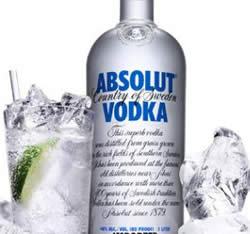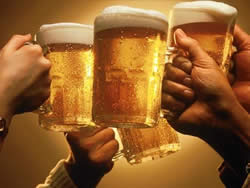Difference between Vodka and Beer
Key Difference: Vodka is a distilled spirit that is composed of water and ethanol. It is made by distilling juices from various fermented substances such as grains, potatoes and sometimes sugar or fruit. Beer is one of the most popular alcoholic beverages that is available and consumed world-wide. Beer is commonly made from malted barley or malted wheat and flavored with hops, herbs or fruits (occasionally).
Vodka and Beer are two complete different drinks and to compare them in the same class is injustice. Both are very popular drinks and are consumed worldwide. Beer and Vodka are different in terms of taste, production process and even consumption. Vodka can be drunk neat but it can also be added to other drinks such as juices and cold drinks to create a cocktail. However, beer is often drunk without mixing with any other flavors.
 First of all alcoholic drinks are created by juice of some product (barley, wheat, grapes, etc.), to which then yeast is added to remove the sugar from the product. After the yeast removes the sugar, drink then becomes alcohol with a very low proof. Some drinks are then put through the process of distillation (a process of evaporation) a few times till it is the strength that is needed. The process of distillation removes the water from the alcohol, leaving purer substances which are stronger. The strength of the drinks is then placed on the bottle in terms of proof; ever notice the 75 or 80 proof on the bottles?
First of all alcoholic drinks are created by juice of some product (barley, wheat, grapes, etc.), to which then yeast is added to remove the sugar from the product. After the yeast removes the sugar, drink then becomes alcohol with a very low proof. Some drinks are then put through the process of distillation (a process of evaporation) a few times till it is the strength that is needed. The process of distillation removes the water from the alcohol, leaving purer substances which are stronger. The strength of the drinks is then placed on the bottle in terms of proof; ever notice the 75 or 80 proof on the bottles?
Vodka is a distilled spirit that is composed of water and ethanol. It is made by distilling juices from various fermented substances such as grains, potatoes and sometimes sugar or fruit. The distillation from sugar and fruit are also sold as flavored vodka. Vodkas were introduced in the United States after 1940s, before this time it was sold in countries such as Belarusian, Polish, Russian and Lithuanian. The traditional vodkas are 40% alcohol by volume (ABV) or 80 proof. In European Union, requires vodkas to have minimum 37.5% ABV for any "European vodka" to be known as vodka. United states requires minimum 30%.
The term ‘vodka’ is derived from the Slavic word voda (water) and is often believed to refer to vodka as little water due to its clear color. Traditionally, vodka was a drink that was expected to be consumed neat (without any additives) in the vodka belt countries of Eastern Europe. However, these days vodka plays a main ingredient in many cocktails including Bloody Mary, Screwdriver, Sex on the Beach, Moscow Mule, White Russian, Black Russian, etc. It can also be consumed with soft drinks or is often great for mixing with gin and tonic.

Beer is one of the most popular alcoholic beverages that is available and consumed world-wide. It is also the third most popular drink following water and tea. Beer is an alcoholic beverage produced by the saccharification of starch and fermentation of the resulting sugar. Beer is commonly made from malted barley or malted wheat and flavored with hops, herbs or fruits (occasionally). Beer has been around since the early Neolithic or 9500 BC, when cereal was farmed. The first recorded history of beer is found in the texts of ancient Egypt and Mesopotamia. According to many archeologists, beer may have been a crucial instrument in forming civilizations.
Beer recipe has also been found in a hymn to goddess Ninkasi in some of the earliest Sumerian writings. The modern beer that is made today was developed in 1516, when William IV, Duke of Bavaria adopted a food regulation known as Reinheitsgebot. The regulation only allowed the use of water, hops and barley-malt in beer. The producing of the beer is known as brewing, while places that are only dedicated to producing beer are known as breweries. Brewing can happen in either a brewery or at home. Producing beer at home or in small amounts is known as homebrewing.
The process of producing beer requires putting the ingredients through a strict process. First malted barley or malted wheat is added to hot water to create a mash, this is known as mashing and is done in a mash tun. The hot water turns the starch into sugars and create a sweet liquid known as wort. The wort is then filtered and separated from the mash into another container which is made of copper and is also known as copper. The remaining grain in the mash tun can be put through another process of washing to collect more fermentable liquid. However, the beer created from this liquid will be weak. The wort that was placed in the copper is boiled for an hour to separate the water from the starch and during this process hops are added to the liquid to give it a sweet, bitter flavor. The longer the hops are boiled, the stronger the flavor. The liquid is then filtered and cooled in another container. Some breweries may put the liquid through another batch of hops during filtering to provide a stronger taste and aroma. After the liquid cools, it is then added with yeast and left to ferment, which can take from a week to a month depending on the strength of the yeast and the beer. Once the yeast settles, the beer is then filtered into kegs, bottles or cans for distribution. Some breweries may also add clarifying agents to the beer to make the beer appear clear and bright.
There are various different varieties of beer:
- Pale Ale: This is a type of beer that uses top-fermenting yeast.
- Stout: Stouts and porters are beers that are darker in color and use roasted malted wheat or barley. These are also brewed with slow fermenting yeast.
- Mild: These beers have a predominantly malty palate. They are dark colored and have an ABV of 3% to 3.6% and can go up to 6%.
- Wheat: Wheat beer is brewed largely from malted wheat and uses only a small portion of malted barley.
- Lager: Lager is the English name for cool fermenting beers of Central European origin. It uses bottom fermenting yeast.
- Lambic: This is a Belgium beer that uses wild yeasts for fermenting.
Image Courtesy: bournemouthtonight.co.uk, urbanbeerhunt.com









Add new comment